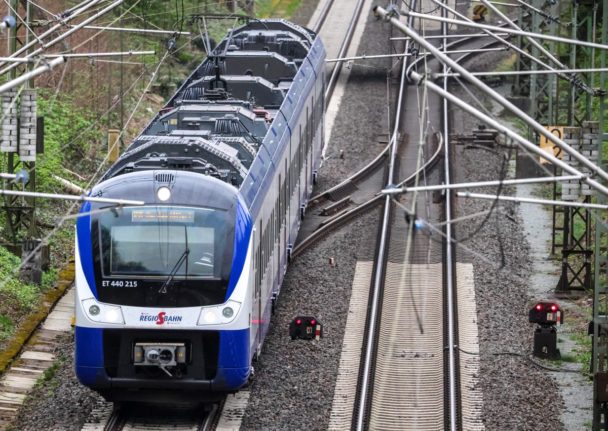“We complain, but we travel by train,” the head of the Allianz pro Schiene transport association, Dirk Flege, told German press agency DPA.
The alliance reported a record for 2023: 104.2 billion passenger kilometres compared with the previous record of 102 billion passenger kilometres achieved in 2019. These figures are obtained by multiplying the number of passengers travelling by train by the distance they travelled.
But if you look at passenger numbers on their own, a different picture emerges, mobility researcher Andreas Knie from the Berlin Science Center for Social Research explained.
According to his data, as many people are travelling on local transport now as there were before the pandemic.
But it’s a different picture on long-distance and regional trains, which are carrying only 80 percent of the usual number of passengers.
“People want to take the train,” said Knie. “But under current conditions they don’t.”
Strikes and delays
It’s true that train passengers aren’t having an easy time of it right now: there have been strikes and numerous train cancellations over the past year, the rail network remains in poor condition and multiple construction sites have been causing delays to passenger journeys for several years now.
READ ALSO: German train strike wave to end following new labour agreement
“It’s not any better on the road,” countered the Pro Bahn passenger association.
On trains, you can at least use the travel time to read, watch films, play cards or drink a beer, said the association’s honorary chairman Karl-Peter Naumann.
He observed that trains had become more crowded, with young people more likely to do without a car. And the €49/month Germany ticket subscription means that passengers also use regional trains for longer journeys of 200 or 300 kilometres, he said.
The Germany ticket has significantly boosted demand, the Pro Rail Alliance agreed.
According to industry sources, the ticket has tied many existing customers more closely to buses and trains. In other words: they now use the €49 ticket to travel instead of the single, monthly or strip tickets they used before.
In order to achieve climate goals, the German government wants to double rail the number of people travelling by train by 2030 compared to 2015. In 2015, passenger kilometres stood at just below 92 billion.
Knie is skeptical about whether this can be achieved.
READ ALSO: PODCAST: Can Germany’s trains run on time, Spargelzeit begins and how happy are Germans?
New restrictions ahead
“The railway has to become more reliable again,” he said, adding that current tax breaks for diesel and company cars would have to be removed so that drivers are encouraged to switch to train travel.
Passenger representative Naumann said that a doubling of the figures “cannot be achieved”, citing a lack of train, track and staff capacity.
The government and rail companies want to tackle the problems on the network in the next few years with a thorough renovation programme: 40 busy routes are to be completely modernised by 2030.
This should make the network less susceptible to disruptions and allow traffic to run more smoothly in the long term.
However, short term, the construction work will see individual routes closed for several months. The overhaul of the network starts in June with the Riedbahn between Frankfurt and Mannheim.
Knie fears that the railway will lose passengers as a result. “You can’t rip people out of their routines for months,” he said.
The government has so far pledged almost 30 billion euros to modernise the network by 2027.
However, this only covers around two-thirds of the total requirement, which the railway estimates will cost around 45 billion euros by 2027. The financing of the network beyond that date remains completely open.



 Please whitelist us to continue reading.
Please whitelist us to continue reading.
Member comments